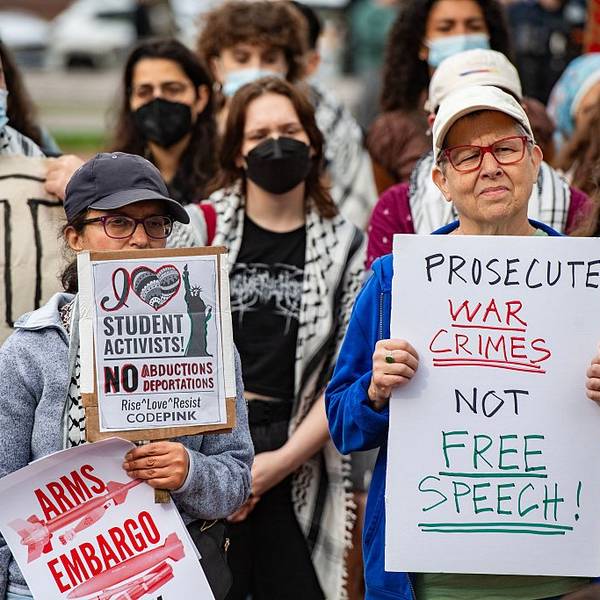Human rights defenders expressed outrage on Friday after Secretary of State Mike Pompeo revealed that the Trump administration is revoking or denying visas for any International Criminal Court (ICC) personnel who try to investigate or prosecute U.S. officials or key allies for potential war crimes.
"This is an unprecedented attempt to skirt international accountability for well-documented war crimes that haunt our clients to this day."
--Jamil Dakwar, ACLU
The move, Pompeo confirmed to reporters Friday morning, is a direct response to ongoing efforts by the ICC to probe allegations of war crimes and crimes against humanity tied to the seemingly endless war in Afghanistan.
Jamil Dakwar, director of the ACLU's Human Rights Program, was among those who spoke out against the decision. The ACLU currently represents Khaled El Masri, Suleiman Salim, and Mohamed Ben Soud, who were all detained and tortured in Afghanistan between 2003 and 2008.
"This is an unprecedented attempt to skirt international accountability for well-documented war crimes that haunt our clients to this day," Dakwar said. "It reeks of the very totalitarian practices that are characteristic of the worst human rights abusers, and is a blatant effort to intimidate and retaliate against judges, prosecutors, and advocates seeking justice for victims of serious human rights abuses."
Richard Dicker, international justice director at Human Rights Watch, called it "an outrageous effort to bully the court and deter scrutiny of U.S. conduct." He encouraged ICC member countries to "publicly make clear that they will remain undaunted in their support for the ICC and will not tolerate U.S. obstruction."
Daniel Balson, advocacy director at Amnesty International USA, noted that this is just "the latest attack on international justice and international institutions by an administration hellbent on rolling back human rights protections."
Visa bans, as Balson pointed out, are "powerful tools typically reserved for the most serious of human rights abusers."
But rather than targeting global criminals, the Trump administration has set its sights on the ICC--an impartial judicial body that aims to promote accountability under international law by probing and prosecuting crimes of aggression, crimes against humanity, war crimes, and genocide.
"Throwing roadblocks in front of the ICC's investigation undermines justice not only for abuses committed in Afghanistan, but also for the millions of victims and survivors throughout the world who have experienced the most serious crimes under international law."
--Daniel Balson, Amnesty International USA
The move is "is highly indicative of [the administration's] culture of disregard for rights abuses," said Balson. "Throwing roadblocks in front of the ICC's investigation undermines justice not only for abuses committed in Afghanistan, but also for the millions of victims and survivors throughout the world who have experienced the most serious crimes under international law."
Pompeo's announcement came after John Bolton, President Donald Trump's national security adviser and a longtime critic of the ICC, threatened to impose sanctions on court officials in September if they continued to pursue an investigation of potential crimes by U.S. civilians or military personnel in Afghanistan.
Echoing Bolton's broader denunciations of the ICC last year, Pompeo on Friday highlighted that the United States--under both Democratic and Republican presidents--has refused to join the court for more than two decades "because of its broad, unaccountable prosecutorial powers and the threat it poses to American national sovereignty."
Warning that "the court could eventually pursue politically motivated prosecutions of Americans," the secretary of state told reporters that the Trump administration is "determined to protect the American and allied military and civilian personnel from living in fear of unjust prosecution for actions taken to defend our great nation."
"These visa restrictions may also be used to deter ICC efforts to pursue allied personnel, including Israelis, without allies' consent," Pompeo added. "Implementation of this policy has already begun."
Watch Pompeo's full remarks to the media on Friday:




